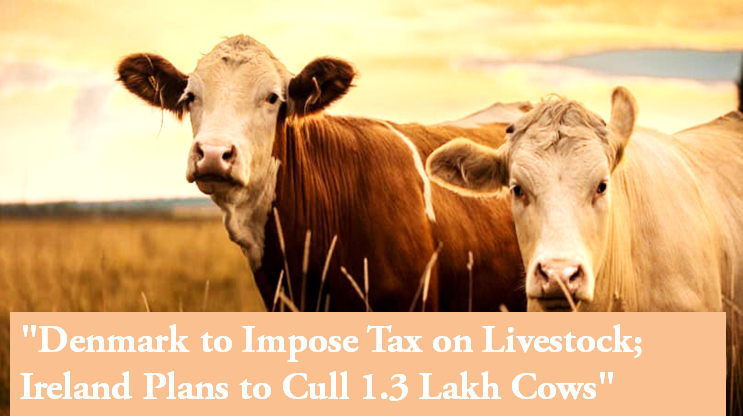Dublin: Denmark has become the first country to impose a carbon tax on cows and pigs, set to take effect from 2030. This pioneering step aims to achieve Denmark’s goal of becoming the first carbon-neutral country by 2045.
In June, an agreement was reached among the government, opposition, cattle farmers, industry, and trade unions. However, the agreement has faced strong criticism, with farmer organisations pointing to similar plans abandoned by other countries, like New Zealand, due to practical challenges.
Details of the Tax
The tax will start at 300 kroner (40 euros) per tonne of carbon dioxide, corresponding to the methane emissions produced by cattle and pigs, and will rise to 750 kroner by 2035. The revenue generated from this tax will be reinvested into the environmental transformation of the agricultural industry.
Opposition from Farmers
The Danish Association for Sustainable Agriculture has criticised the agreement, with its president, Peter Kier, stating that it threatens the agricultural sector and food security. Despite the government proposing a 60% tax cut to provide relief to farmers, organisations argue that this measure is insufficient. They also highlight a forecast by the Department of Finance predicting over 2,000 job losses in the agricultural sector by 2035.
Impact on Pork Exports
Agriculture covers more than 60% of Denmark’s land area, and the country is one of the world’s leading pork exporters, accounting for half of its agricultural exports, according to the Agriculture and Food Council.
Support and Criticism from Greenpeace Nordic
Greenpeace Nordic’s campaign leader, Christian Fromberg, praised the government’s move as a promising step, noting that other countries lag in climate action. He emphasised that leaving 140,000 hectares of land fallow will help increase carbon storage in the soil, reducing greenhouse gas concentrations in the atmosphere. However, Fromberg also criticised the plan for missing an opportunity to redirect agriculture towards sustainability, pointing out that excessive nitrogen production deoxygenates water, threatening marine flora and fauna.
Ireland’s Approach to Reducing Emissions
In contrast, Ireland has been advised to cull 1.3 Lakh cattle as part of its strategy to reduce greenhouse gas emissions from the agricultural sector. This mass slaughter is seen as a crucial step for Ireland to meet its emissions reduction targets. The prospect has caused significant concern among Irish farmers, as highlighted in a KPMG report published in the Irish Farmers Journal.
The Role of Agriculture in Emissions
The debate over agriculture’s role in carbon emissions reduction is particularly heated in Ireland, where the sector contributes 35% of national greenhouse gas emissions, three times the European average. Over 60% of these emissions come from methane produced by ruminant animals like cows. Methane, a greenhouse gas 25 times more potent than carbon dioxide, makes livestock a significant environmental challenge.
Irish Samachar English News
{OR} Kindly click to follow the Irish Samachar News channel on WhatsApp


Comments are closed.